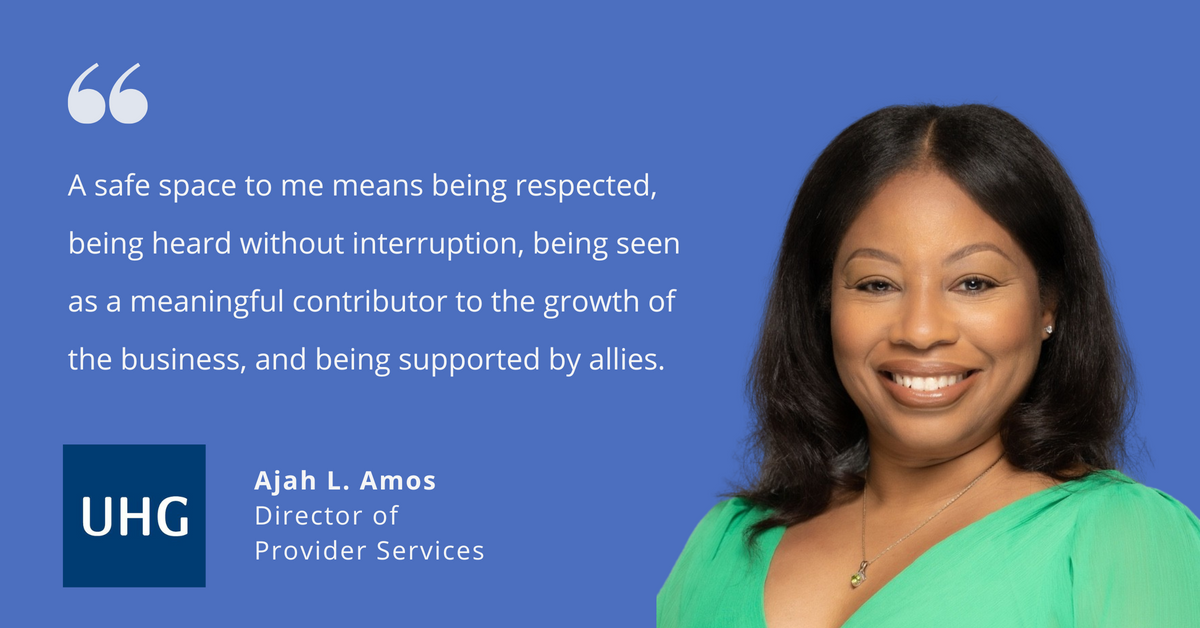Black individuals make up 13% of the U.S. population but only account for 8% of employees in professional roles. In addition, only 3.2% of executive or senior leadership roles are held by Black professionals, and less than 1% are represented among Fortune 500 CEO positions.
Ajah L. Amos, director of provider services at UnitedHealth Group, understands how underrepresentation in high-level positions creates a ripple effect impacting Black professionals’ growth.
“As not only a person of color but also a woman, I often experience double standards,” Ajah shares, highlighting the difficulty of finding acceptance in the workplace. “A safe space to me means being respected, being heard without interruption, being seen as a meaningful contributor to the growth of the business, and being supported by allies.”
We sat down with Ajah to discuss how companies can create safe spaces for Black leaders to feel respected, heard, seen, and supported. Here are the top three takeaways from our conversation.
1. It starts with leadership.
Ajah believes that diversity, equity, and inclusion initiatives start where influence and power lie: leadership.
She shares an example from her work at UnitedHealth Group, saying, “One of our senior leaders, a white male, challenged his colleagues to think differently about the term ‘grandfather.’” This term commonly describes exempting long-time customers from new requirements but stems from a provision in several southern state constitutions designed to enfranchise poor whites and disenfranchise Blacks.
“Being able to witness courageous support by an ally then translates to individuals, like myself, feeling reassured that there is authentic support and care being put toward diversity, equity, and inclusion,” says Ajah.
She’s also witnessed the responsibility that falls on senior leaders through her work as the wing equal opportunity director for the Air National Guard.
“Rank and structure are respected in the national guard,” she says. “Ensuring a safe space for employees means making sure that you’re available and accessible emotionally and from a mentorship perspective so that those who are not on the same level — or in the leadership arena — feel comfortable being their authentic selves.”
2. Put a premium on your people.
“Organizations, especially Fortune 500 companies, are in a unique position to not only flex their capital and status but also to cascade that to the masses and cast an amazing leadership shadow that's going to influence others,” starts Ajah.
She describes the reverberation of this people-first approach by pointing out the positive impact on both the corporate environment and employee experience.
“When I know that I’m part of an organization that puts a premium on people, it excites me. It inspires me to move more and work harder towards our mission,” Ajah says. “That’s the secret sauce for companies — when they get it right, they receive extra energy, warmth, drive, and passion from their people.”
3. Create community within your company.
“Double hand clap for employee resource groups (ERGs),” Ajah says with a smile. She’s seen firsthand how ERGs bring together teammates and level the playing field by offering professional development opportunities for all.
“I was floored by the quick adoption and growth of our African American Experience ERG and realized that it was absolutely necessary and the right thing to do. We experienced over 400% growth in less than one year,” she says.
Ajah also believes that community can be leveraged as a tool for managing microaggressions in the workplace. She offers the example of implementing a “crockpot mentality” when dealing with uncomfortable commentaries. Instead of quickly reacting — like a microwave — take the time to lean into relationships and consult your community for unbiased opinions. These various “ingredients” create a better, more satisfying end product.
“Keep a ‘board of directors’ in your life that can be objective and detach any emotional response to how they advise you. Use them to explain the encounter and come up with constructive ways to address the situation,” she says.
At the end of our conversation, Ajah reminds us of the most fundamental factor in creating safe spaces for Black leaders. “Be a good human,” she says. “When you see something, say something. Don't tolerate inequities. Call those things on the carpet. Have your trusted board of directors to bounce ideas off of and be your support. Encourage your allies to be courageous and stand with you.”
Join the organization making the health system work better for everyone. Check out opportunities with UnitedHealth Group today.And for even more insight into how companies can create safe spaces for Black leaders, watch the full conversation with Ajah L. Amos here.




